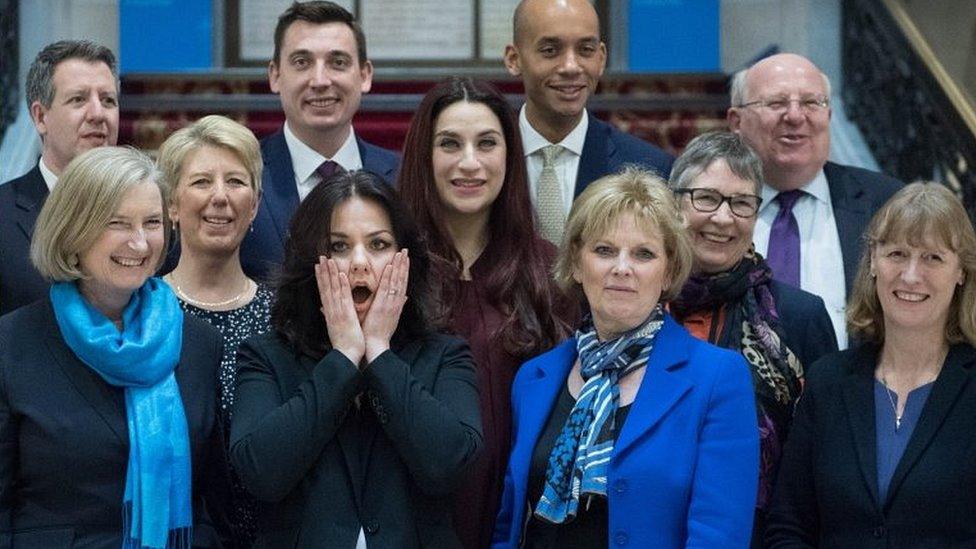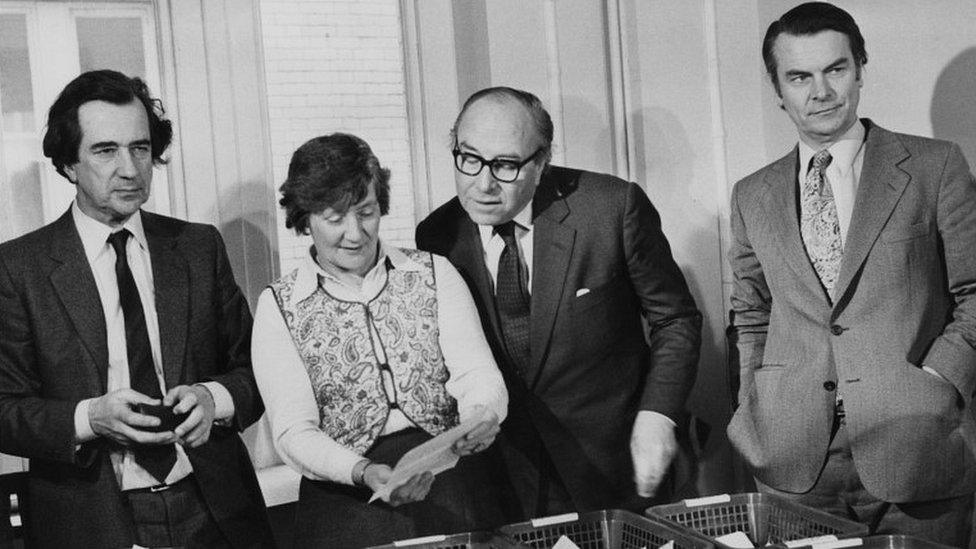The party that didn't quite change UK politics
- Published

The Independent Group hoped for a realignment in British politics
For a few weeks in the spring, a small group of ex-Labour and ex-Tory politicians - The Independent Group - was rarely out of the headlines. After two name changes and more than half its MPs leaving, it barely registers today.
When the The Independent Group was launched, the plan was to force a major realignment in British politics and entice others away from the main parties.
"This isn't some sideshow," insisted Anna Soubry, the most prominent of the three Conservatives to join the group. "This is serious. We need a new political party and it's absolutely got to be done."
The announcement of the new group in February came as a surprise, but preparations had begun in the autumn of 2017.
Gavin Shuker organised trips for up to 20 fellow Labour MPs unhappy with Jeremy Corbyn's leadership to meet in a Sussex farmhouse, where they discussed and plotted a breakaway. "I managed to get them out of London on crowded trains without anyone noticing," he said.
Mr Shuker became the convenor of what was to become The Independent Group. Alongside other Labour MPs Chuka Umunna and Chris Leslie, he persuaded a small number of colleagues to make the leap in February. The plan was for many more to follow.
All was going well, but then came a dramatic intervention by Labour's deputy leader Tom Watson, who set up a grouping to rival TIG - but staying within the Parliamentary Labour Party. The aim was to keep people inside Labour, which it effectively did, starving TIG of new recruits.
Too much too soon?
Despite the initial bonhomie among the 11 TIG MPs and encouraging poll ratings, it soon became clear that they lacked the organisational firepower to build momentum.
"We're overstretched and being treated as one of the principals on the field of play," Mr Umunna said a few weeks after the group formed. "That's exciting, but we're also absolutely exhausted."
What really held the MPs back, though, was indecision over who would be leader. Most wanted Mr Umunna, the most prominent of the Labour politicians inside the group, to take on the role, but some resisted.
He argued they wait until the autumn to elect a permanent leader. It was agreed that Heidi Allen, one of the former Conservatives, relatively unknown outside Parliament, would become interim leader. "It was a messy compromise," recalls Mr Shuker.

You can listen to Splitters, presented by Peter Snowdon, on BBC Sounds.

Without properly settling the leadership question, the group's voice struggled to be heard as events took an unexpected turn.
Following the third defeat for Theresa May's attempts to pass her Brexit deal through Parliament, the UK's participation in the European elections became inevitable.
TIG had all along planned to register itself as a political party, but the onset of the elections hastened key decisions.
"There was quite a well developed idea that we could actually act as a power broker to bring the other Remain parties together," says Mr Shuker. "But we chose to stand 70 candidates and that forced registration with the Electoral Commission.
"At that moment, I felt there was something of that project that was open and hopeful that was just dying because the bigger realignment that we all thought we were contesting for cannot come about through 11 people setting up one political party."

The split brought back memories of the "gang of four" Labour politicians who founded the SDP in 1981
The group registered under the party name Change UK and fought the campaign, but disagreements over its fundamental purpose would not be resolved. It was increasingly hard to distinguish the party's anti-Brexit message from that of the Liberal Democrats.
Ms Allen, who argued for co-operation with the other pro-Remain parties, attempted to quit as leader a few days before the election. "I tried to express how deeply uncomfortable I felt and maybe it would be better if I resigned," she says, "but the shared view was that it wasn't the right time to do it."
A series of mistakes and mishaps exacerbated divisions among the 11 MPs. The party's new name, Change UK, a last-minute choice after the Electoral Commission rejected the acronym TIG, became a source of ridicule.
More seriously, its number-one candidate in Scotland defected to the Liberal Democrats and another candidate in the South West, Rachel Johnson, openly questioned the campaign strategy.
Elections calamity
The European elections were a triumph for Nigel Farage's Brexit Party, topping the poll, and a success for the Liberal Democrats, who came second. But they were disastrous for the two main parties.
For Change UK, the elections were calamitous. It secured only 3% of the vote and failed to win any MEPs.
Breaking up was only a question of time, according to Mr Shuker. "We met a few days after those results were out. Everyone laid their cards on the table. There was huge contempt around the table, very sadly, and I just felt coming out of that meeting, this is not coming back.
"I had hoped for an amicable settlement, but those of us who had really invested most in The Independent Group were cast as splitters."
When the split came, Ms Allen, Mr Umunna, Mr Shuker and three others quit the party, while Ms Soubry went on to lead the remaining five MPs.
She pinned the blame on naive and inconsistent leadership, while Mr Umunna, who a few weeks later joined the Liberal Democrats, admitted it had "proved very hard to start something new from scratch".
He reflected: "In a parliamentary system it's far better to work with the tremendous assets, people and forces that there are already are in the centre ground...
"Things didn't turn out in the way we thought they would and that's very difficult to accept."
For Ms Allen, it had been a worthwhile exercise. "When politics students are studying this in 10 years from now, they will see all these little jigsaw pieces as having clicked into place at the right time to enable us to get what I hope will be from this desperate paralysis we have from Brexit.
"Yes, of course it's disappointing on a personal level, but you are not in this job to make friends."
In June, Change UK had to take a on a new name, after the petitions website Change.org raised concerns. It became The Independent Group for Change.
What had begun in the spirit of friendship and co-operation ended in acrimony and division.
The motivation to split away and form a new political force was deeply felt by this small group of politicians, but their traumatic experience may well serve as a lesson to others in the future.